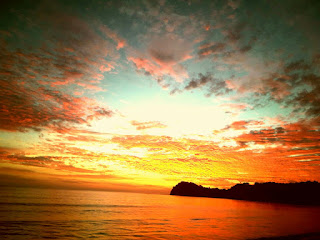Chapter 64. Aftershocks of the earthquake
It seemed impossible that the populations affected by the earthquake could return to normality.On San Miguel Island, people came together to protest, because they refused to leave their homes.
-It is that they have always told us that we are going to disappear and totally here we are- was the cry of the stubborn German who led the protest together with the members of the ecological foundation that he had founded.
"But you told me yourself that the island has sunk," Máxima said to the German friend of her father, when he was leading the protests along the main street of the island and a crowd accompanied him.
-I have reviewed the history of the town and on repeated occasions there have been earthquakes, storms that have even brought holes that flood the island, but apparently it always comes back to life.
- But the reports of national and foreign experts recommend that people move to the other side to avoid further damage
- I know, I have read them, but I have my doubts, and I have my house here on the Island, I don't see myself outside of it.
-You have your land in the mountains, with centuries-old trees, which you have cared for for years, there you can build a house, in your protected forest, with birds and wild animals, with a field.
- I know, but here I have my job, my income, like many of the people who protest with me, here we have the school, the college, the hospital.
-But the government is building a Siglo XXI school, much better than this one, it is building a new hospital, a children's center, and I have been amazed by the speed with which they are building new houses for the population, at the entrance to the road to El Manglar. They place metal panels on the sides, an iron frame in the center, and pour the concrete. They make hundreds of houses simultaneously, finishing them at an unknown speed.
Máxima's arguments failed to dissuade the stubborn German, or his followers.
Back at the dispensaries where she worked, she saw how in all the 9 towns of the Marine Reserve people stopped living in their houses, they lived in black plastic houses, with wooden frames made by farmers and fishermen.
In the houses the victims remained, waiting for the trucks to arrive that brought food, water, clothes, mattresses, stoves, pots. Waiting for donations, the population stopped going to work on their farms, which were practically abandoned for the next almost 12 months. Only the fishermen went fishing, because they had debts.
Briseida, the 85-year-old healer and the person most loved by her father and the people, as she was the first promoter of the children's center, the healer and the one who led the rosary in the church for 30 years, made processions through the street del El Faro, followed by the women and children of the town, after each new earthquake, which was repeated 3,500 times, in the following 11 months.
The venerated image of Saint Francis and the photo of Pope Francis were in front, behind them the women who carried candles at night and from the cans with palo santo and incense came an aromatic smoke. After the procession, she would settle into their talk huts, full of mattresses, children and people who took turns preparing the pots of food, or washing the dishes.
One day the regional director of the Red Campesina arrived, which has its headquarters in a province of the Sierra, that woman together with the provincial director, arrived with trucks loaded with everything the population needed and organized the care in a town hall .
"You don't have to come," the local director told him.
- What do you mean? Why do you want me to stay at the dispensary?
-Because you don't need it.
That sounded like an insult to him. She was the person who told her that the worst of the Red Campesina auxiliaries would come to work in Las Gaviotas, but then, when the problems with that woman came, she took the side of the auxiliary, betrayed her. Máxima stared at her, it is her face that once again recognized the hypocrisy, the double standards of the people of Quito and the Sierra, with which she was familiar from her childhood.
- Well, I will go and treat my patients, the others can be treated by the other doctors you have brought- was Máxima's reaction, who when yelling at the director, she disrespected her, that practically put an end to any kind or friendly bond. sympathy they felt for each other. In doing so, she remembered that she, her father's friend, advised her to join the Peasant Health Network, she took her to work in the new dispensary for fishermen in Santo Tomás, but apparently she sided with Máxima's enemies , who rejected her not only because she was from Quito, but because of the marked regionalism that existed in the La Esperanza Network, which was accentuated when a mountain woman, her current boss, was appointed director.
Despite the novelty of the new doctors, they all finished soon, only Máxima had patients until the end.




Comentarios
Publicar un comentario